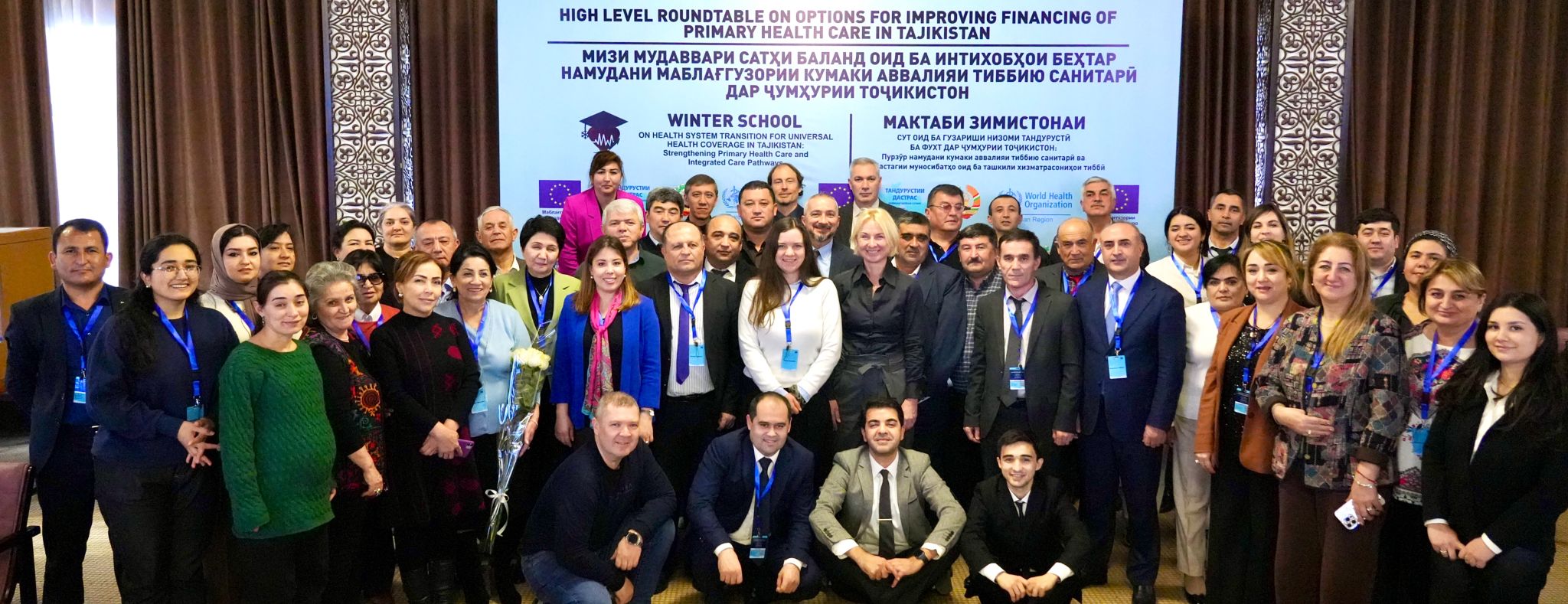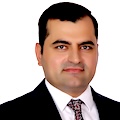The WHO Winter School in Tajikistan, which recently celebrated its fifth edition, has become an essential initiative for advancing health system reforms in Tajikistan. Over the past five years, it has fostered cross-sectoral collaboration, offering a platform where key stakeholders from diverse sectors come together to share knowledge, discuss challenges, and develop innovative solutions.
Organised by the World Health Organization (WHO), with funding from the European Union (EU) and the UHC Partnership (UHC-P), the Winter School continues to build Tajikistan’s capacity to deliver equitable and affordable health care, serving as an important model for other low- and middle-income countries pursuing universal health coverage.
Strategic, cross-sectoral collaboration driving systemic reforms
A defining strength of the WHO Winter School is its unique ability to bring together stakeholders not only from the health sector but also from finance, labour, economic development, and even the national parliament of Tajikistan. This facilitates crucial, cross-sectoral dialogue, ensuring that health system improvements are holistic, sustainable, and widely supported.
“The Winter School has significantly improved our coordination with other ministries, aligning our policies and planning,” said Dr. Gafur Mukhsinzoda, First Deputy Minister of Health of Tajikistan. “It’s become a dependable annual event for collaboration and accelerating progress towards universal health coverage.”
Building capacity and facilitating strategic dialogue
The WHO Winter School plays a crucial role in deepening participants’ understanding of health system reforms, particularly in health financing and governance. Each edition builds upon the previous year, reinforcing key areas and offering new insights. In addition, each Winter School focuses on specific technical areas, offering targeted sessions that allow participants to explore key health system challenges in greater detail. Key topics covered over the years include:
- Integrated care pathways: Improving care coordination and optimising patient journeys for managing chronic diseases like diabetes and hypertension.
- Strategic health financing: Exploring performance-based financing mechanisms to support primary health care services, reduce out-of-pocket expenses, and ensure efficient resource allocation.
- Medicines accessibility and financial protection: Developing strategies to ensure affordable access to essential medicines, particularly for chronic conditions in low- and middle-income settings.
- Health workforce strengthening: Identifying approaches to retain skilled health professionals and ensure equitable distribution of healthcare resources across urban and rural areas.
- Public financial management and governance: Reviewing best practices in budget management, resource allocation, and governance improvements, with practical lessons from ongoing pilot programs designed to increase financial transparency and efficiency.
These sessions have fostered meaningful exchanges on technical areas, deepening colleagues’ understanding of different parts of the health system and how to integrate this knowledge into the design and implementation of health reforms.
WHO’s role in supporting Tajikistan’s health system reforms
The WHO Winter School has become a flagship event supporting Tajikistan’s progress toward universal health coverage. Through implementation of the EU-funded Health Development Programme, and the UHC-P, WHO has provided critical technical assistance, extensive capacity-building, and strategic guidance.
Notable WHO contributions include:
- Conducting the health financing progress matrix assessment, creating a baseline to track Tajikistan’s progress in strengthening health financing mechanisms,
- Developing the WHO European Region’s first-ever health labour market analysis, guiding evidence-based planning for healthcare staffing, retention, and equitable distribution.
- Supporting the presidential approval of regulations introducing new health financing models in Sughd Oblast, including pooling funds, capitation-based payments, and strategic purchasing mechanisms.
“The WHO Winter School demonstrates how strategic, evidence-based collaboration transforms complex health system and financing concepts into practical reforms,” notes Dr. Ilker Dastan, WHO Health Policy Advisor in Tajikistan. “This initiative empowers national stakeholders to implement changes that directly improve healthcare access and quality.”
Deputy Minister of Finance, Mr. Sarvar Qurboniyon, further underscores WHO’s impact: “WHO’s technical support has significantly improved public finance management and optimized healthcare resource allocation. This collaboration helps us effectively utilise increased social sector funding announced by the government.”
Strengthened health system and impact on public health
The WHO Winter School has catalysed several positive developments within Tajikistan’s health system, bringing the country closer to achieving universal health coverage:
- Increased public funding for health, enhancing service delivery nationwide.
- Raised health worker salaries, addressing an important barrier to performance and retention.
- The launch of several pilot projects, introducing key health system reforms, focusing on enhancing primary health care service delivery, improving health financing, and elevating the quality of care.
- Enhanced focus on primary health care, evidenced by an increased number of family doctor residents and improved infrastructure and governance.
These achievements underscore the WHO Winter School’s critical role in translating strategic discussions into meaningful, real-world improvements in public health.
A model for global health system reform
As global health systems face evolving challenges, initiatives like the WHO Winter School represent effective, collaborative approaches capable of driving sustainable change, improving health outcomes, and promoting equity in healthcare delivery worldwide. initiatives is key to supporting countries’ efforts to advance toward UHC.
The success of Tajikistan’s WHO Winter School highlights the importance of sustained international collaboration and the need for continued investments in knowledge-sharing to drive health system reforms. Its integrated, cross-sectoral approach provides valuable insights for other countries seeking systemic health reforms.


